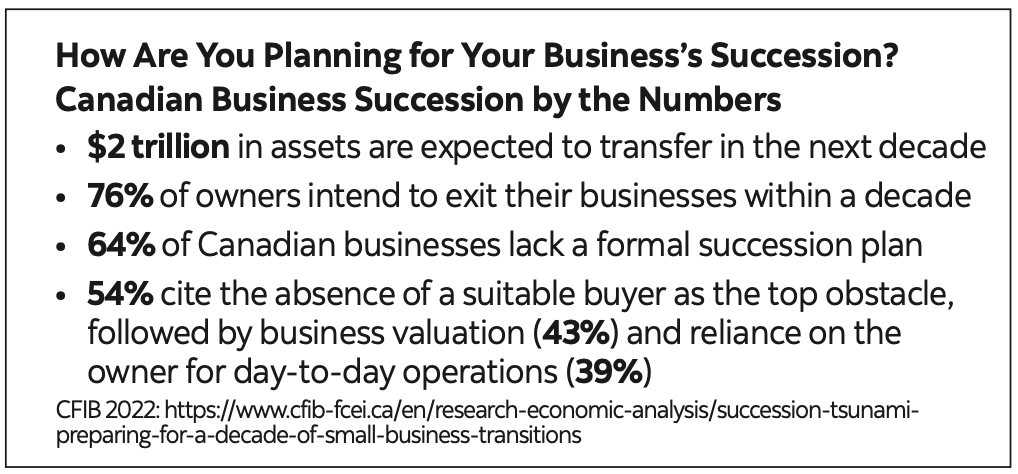Even if you are years away from transitioning your business, understanding its value today is important. Knowing your business’s worth not only sets realistic expectations, but also supports strategic decisions around growth, succession, and family planning. In fact, studies continue to suggest that business valuation is one of the top obstacles in business succession planning (see inset).
A Sale Process Can Reveal Surprises
It’s not uncommon for a business sale process to uncover a lower value than the owner expected. Many business owners overestimate their company’s worth for several reasons:
- Market valuation vs. book value — Owners may include intangible assets, like goodwill or revenue potential, in their estimates, while buyers may only focus on cash flow (what the business earns today and can realistically pay them back).
- Industry multiples — Valuation often relies on comparable sales in the sector. Market conditions, growth potential, and industry trends can lower the multiples applied.
- Dependence on the owner — If the business relies heavily on the founder (or other key personnel), buyers may discount its value.
Knowing your business’s value early can prevent surprises, set realistic expectations, and lay the foundation for planning across multiple areas, including growth strategies, tax planning, and succession decisions:
Maximizing Future Value — Understanding the drivers of your current valuation can help identify opportunities to increase value over time. This may lead to strategic investments or operational improvements to help position the business for a higher valuation when the time comes to transition.
Tax Planning — Knowing your business’s value allows for proactive tax planning. For example, accessing the Lifetime Capital Gains Exemption (LCGE), or the new Canada Entrepreneur’s Incentive (CEI), may take years to implement. Transferring shares of a private company to adult children, even as gifts, is usually deemed a disposition at fair market value (FMV), potentially triggering capital gains tax. Tax-planning options such as an estate freeze or the use of a family trust may help better manage these tax implications.
Fairness Among Heirs — If not all children are involved in the business, valuation can help plan for estate equalization. For example, if one child inherits the business, others receive assets of equivalent value. This can help prevent family disputes. Clear communication about the business’s value can also reinforce that ownership is an earned responsibility rather than a gifted windfall, potentially minimizing entitlement and promoting stewardship.
Timing & Financing a Future Transition — Understanding value helps guide decisions around the timing of a sale or transition. Market conditions can affect a valuation. If succession is within the family and children need to buy you out (partially or fully), knowing the valuation establishes the basis for planning buy-sell agreements, financing, or staged transfers.
Retirement & Estate Planning — For many owners, the business represents the bulk of their wealth. Knowing its value early can help project and plan for retirement income after the transition, as well as for future estate distribution, ensuring financial longevity and security for you and your loved ones.
Understanding your business’s value today gives you greater control over the future. It allows you to plan strategically, protect your family’s interests, and maximize the legacy you’ve built. As a business owner, if you would like business planning support that goes beyond wealth management, our broader group of specialists can assist. Please call.

.png)




.png)

.png)

